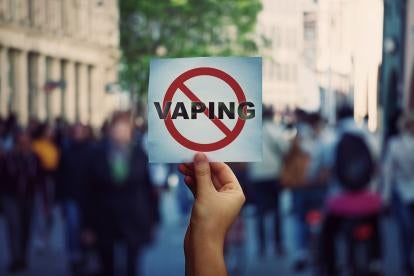On June 28, 2021, North Carolina Attorney General Joshua Stein announced entry of a final consent judgment between JUUL Labs, Inc. (JUUL) and North Carolina. This consent judgment ends a nearly two-year legal battle and marks the first time a state successfully settled a lawsuit against JUUL, the leading U.S. e-cigarette company. North Carolina’s original complaint alleged that JUUL engaged in unfair and deceptive practices that targeted young people to use its pod-based electronic nicotine delivery system (ENDS), including downplaying the effects of nicotine, in violation of the state’s Unfair and Deceptive Trade Practices Act.[1] While JUUL denies any wrongdoing or liability in the agreement, the consent judgment prescribes several requirements and restrictions on JUUL’s continued operations in the state.
The North Carolina Consent Judgment
JUUL must pay a fine of $40 million over the next six years as part of the consent judgment. The fine is intended to be used to support various state ENDS cessation research and prevention programs. JUUL can apply for a waiver of the final $4.5 million should the North Carolina Attorney General and North Carolina Department of Health and Human Services find JUUL compliant with the agreement and that the payments, or other actions, have contributed to a “significant decline in usage of JUUL Products by Underage Individuals.”
Additionally, the consent judgment enumerates numerous conduct requirements and restrictions on JUUL’s activities within the state. Although advertised as “drastic” business changes for JUUL, many of these restrictions and requirements appear to have already been implemented by the company as part of its ongoing efforts to reinvent itself, address public health concerns, and comply with FDA requirements. The following sections of the consent judgment are organized by general activity and briefly summarize the conditions that bind JUUL.
Promotion and Marketing:
-
JUUL cannot use content or marketing that would likely appeal to underage individuals, including the use of cartoons, phrases, and images, that would likely appeal to minors, the use of individuals under the age of 35 in marketing, and the use of advertising channels that have significant underage audiences.
-
JUUL’s postings on social media are limited to testimonial videos of older habitual combustible cigarette smokers using JUUL products and other non-promotional materials. Additionally, the creation and use of JUUL-brand hashtags for social media use are forbidden.
-
JUUL cannot retain or encourage an individual through payment or other consideration to promote JUUL products on any social media platform or—with limited exceptions—in person.
-
JUUL cannot provide free products to consumers in North Carolina nor send direct-to-consumer market materials to unverified North Carolina residents.
-
JUUL must take reasonable efforts to monitor social media platforms and third-party websites for content that is impermissible under the terms of the consent judgment.
-
JUUL cannot place advertising at any location within 1,000 feet of any elementary, middle, high school, or public playground in North Carolina nor in public transportation facilities (retail stores in such public transportation facilities are exempted) in North Carolina.
Sponsorships and Youth Education:
-
JUUL cannot sponsor any sports and entertainment events held in North Carolina.
-
JUUL may sponsor and/or provide financial support for a charity event in North Carolina, as long as JUUL does not require its branding to be displayed, JUUL does not reference the event in its marketing, and JUUL—or a representative—does not promote its products at the event.
-
Without permission from the Attorney General of North Carolina, JUUL can neither directly fund or operate any youth education campaigns or youth prevention activities in North Carolina, nor provide materials on youth education programs or events.
Retail and Internet Sales:
-
JUUL must abide by strict age verification requirements and youth access restrictions, including online independent age verification with shipping confirmation via phone (and ensuring third-party sales partners do the same); verified consumer warranty program replacements; serial number tracking, tracing, and youth confiscation reporting via a dedicated website; and automated sales controls and barcode age verification at the retailer level.
-
JUUL cannot distribute, sell, offer, or otherwise provide any pod in any flavor or nicotine concentration in North Carolina or to North Carolina Retail Stores that JUUL did not distribute to or sell in as of the Effective Date (June 28, 2021) unless JUUL receives FDA authorization that permits the marketing of that pod flavor or of that nicotine concentration.
-
JUUL must impose certain quantity limits for online sales to North Carolina residents through a JUUL owned website.
-
JUUL must require North Carolina retail stores selling JUUL products to implement automated age-verification systems at the point-of-sale, along with quantity sale limits.
-
All JUUL products in North Carolina must be behind the counter and inaccessible without the help of a retail employee.
-
JUUL must institute a secret shopper retailer compliance program for North Carolina Retail Stores to verify implementation of these requirements. The program prescribes monthly (no fewer than 50 North Carolina retail stores) and yearly (at least 960 North Carolina retail stores) requirements and a uniform penalty escalation structure. Significantly, the penalty requirements include mandatory reporting of the non-compliance to FDA after the fourth age-verification failure.
Health Claims:
-
JUUL cannot make any health or therapeutic claims (e.g., smoking cessation) in its marketing or advertising materials in North Carolina unless JUUL receives FDA authorization for such claims.
-
JUUL cannot make any claims in its marketing or advertising materials in North Carolina comparing the quantification of nicotine in JUUL products versus those found in combustible cigarettes or any other ENDS unless JUUL receives FDA authorization for such claims.
-
If JUUL makes any statement about nicotine content in its labeling or marketing materials, it must disclose nicotine content by both weight and volume, and in both milligrams and by a percentage in terms of total volume of a JUUL pod. This would apply until FDA implements a uniform nicotine content disclosure standard or until JUUL products receive FDA marketing authorization permitting specific nicotine content disclosure.
Lastly, the consent judgment includes a “most-favored nation” clause which stipulates that if JUUL enters into a more favorable settlement or consent judgment with another state before March 31, 2025, then North Carolina may elect to seek a review of the terms of its consent judgment.
Additional Legal Issues
On the heels of the North Carolina consent judgment, Congressman Raja Krishnamoorthi (D-IL) and Senator Richard Durbin (R-TN) sent a letter to Dr. Janet Woodcock, current FDA Acting Commissioner, calling for FDA to review all documents associated with the North Carolina case against JUUL prior to FDA making a marketing authorization determination of the company’s Premarket Tobacco Product Applications (PMTAs). The letter specifically cited to Dr. Woodcock’s promise during the recent House Oversight Committee hearing on Youth Vaping to “consider a company’s prior youth targeting, bad acts, and violations of law” specifically when assessing a JUUL’s PMTAs. It will be telling to see how this all plays out in the ultimate marketing determination of the JUUL products and potential FDA post-marketing requirements.
In addition to the North Carolina consent judgment, JUUL also faces a panoply of other legal issues. JUUL is currently engrossed in similar legal battles across thirteen states, including California, New York, and Illinois. The core allegation in these suits is that JUUL’s marketing practices contributed to a public health crisis, particularly among the states’ teenage population. JUUL is also party to multidistrict litigation in the U.S. District Court for the Northern District of California.[2] The multidistrict litigation consists of individual personal injury cases, school district public nuisance cases, county and municipality cases, and class action cases.
In addition, last year the Federal Trade Commission filed an administrative complaint alleging that Altria’s acquisition of a 35% stake in JUUL—a deal totaling $12.8 billion—was a violation of federal antitrust laws.
[1] Complaint at 1, North Carolina, ex rel. Joshua H. Stain v. JUUL Labs, Inc., No. 19CVS2885 (N.C. Super. Ct. May 15, 2019), 2019 WL 7403771.
[2] Due to the level of interest in this case, the U.S. District Court for the Northern District of California created a public webpage specifically for this litigation. See In re: JUUL Labs, Inc. Marketing, Sales Practices & Products Liability Litigation, U.S. Dist. Ct. for the N. Dist. of Cal.
Ian J. Murray also contributed to this article.





 i
i


